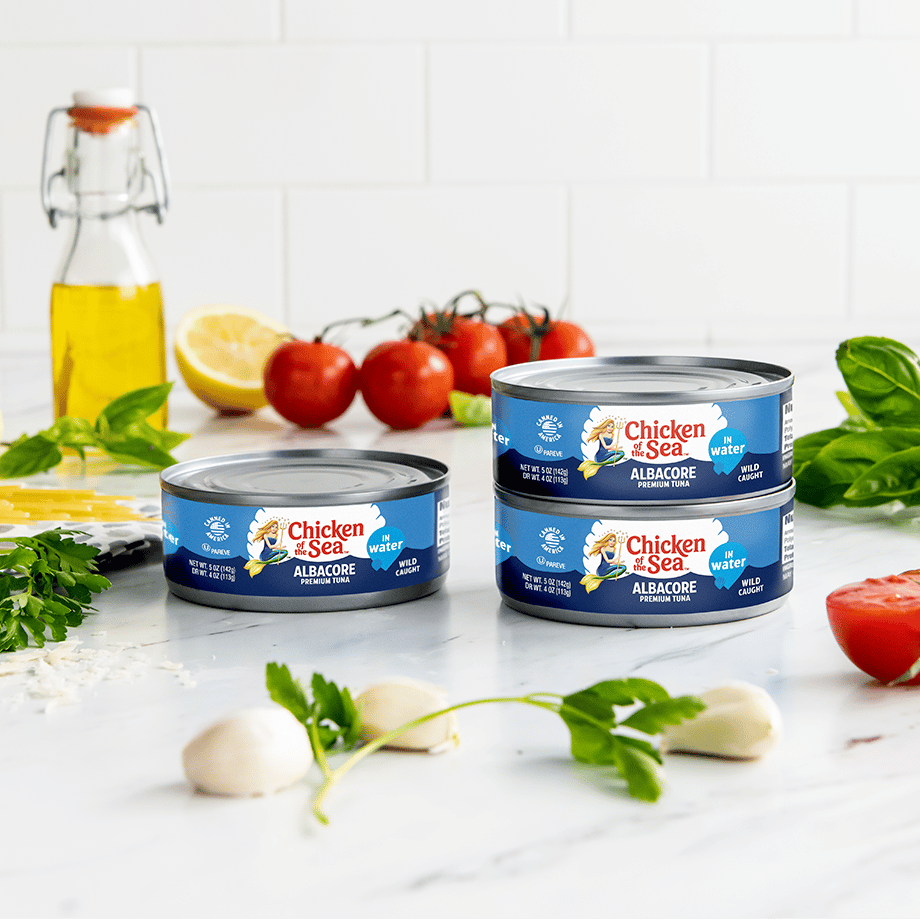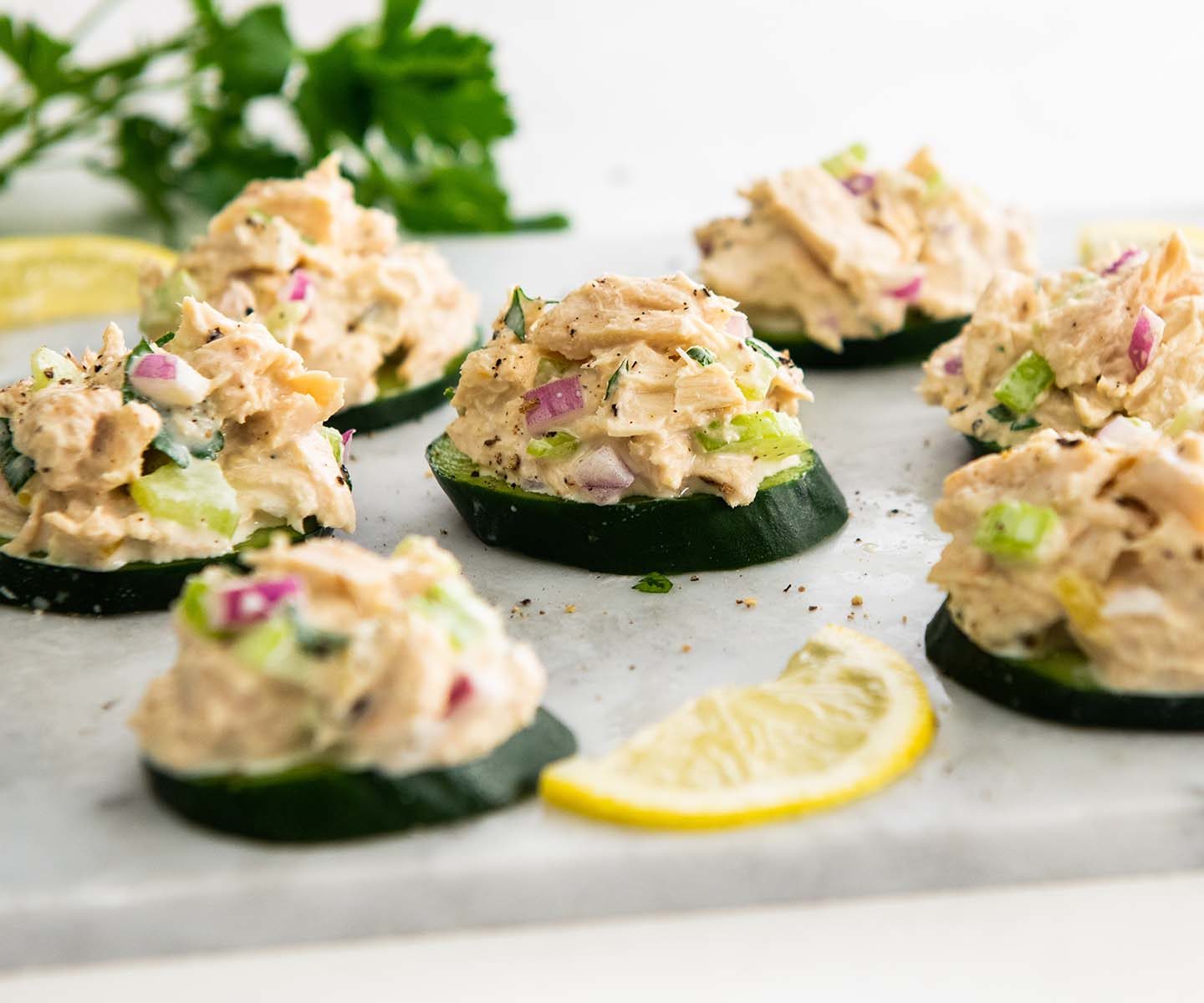When it comes to nutrition, there’s lots to love about albacore. One can of albacore tuna in water contains 29 grams of complete protein, vitamins D and B-12, heart-healthy omega-3 fatty acids, and minerals like iron, potassium, and selenium. And for all these benefits, there is just 1 gram of fat and 130 calories in a can of tuna.
Protein: Build healthy muscles, skin, and bones
Albacore is an excellent source of protein: A four-ounce serving contains 29 grams. Plus, all that protein is complete protein, which means it contains all nine amino acids that your body can’t produce itself. This is why it’s included in Mediterranean, Weight Watchers, Keto, and Paleo diet plans and recipes such as keto tuna salad.
Protein is required for a wide range of essential bodily functions. The amino acids that make up proteins are required to build bones, cartilage, skin, and muscles. Eating enough protein is therefore a crucial part of a healthy diet. On top of helping build healthy muscles, skin, and bones, lean proteins keep you feeling full longer than carbs and fat, and this helps with weight loss.
Omega-3s: Support a healthy heart
Albacore tuna has less fat than other animal proteins like chicken and beef, but it’s a good source of a particular type of fat: Omega-3 fatty acids. A diet rich in omega-3s is associated with lower inflammation levels, lower blood triglycerides, and an overall lower risk of heart disease.
Eating fish is an easy, delicious way to enjoy the health benefits of omega-3s (which is a key advantage of the pescatarian diet over a vegetarian diet). Canned albacore contains around 0.2 grams of omega-3s per serving, about 15-20% of the adequate intake for adults according to the National Institutes of Health (NIH).
Vitamin D: Keep your bones and immune system strong
Like protein, Vitamin D is an incredibly important nutrient for bone health. This is because we can’t absorb calcium without it—and we can’t build or repair bones without calcium. Vitamin D also plays an important role in supporting a healthy immune system.
Sun exposure is an easy way to make your own Vitamin D, but you can also get it from certain foods. Albacore tuna is one of the few foods that naturally contain it. A 5-ounce can of tuna can contain up to 15% of the Daily Value.
Vitamin B-12: Fuel healthy energy metabolism and red blood cells
Another important vitamin in albacore tuna is Vitamin B-12, which your body needs to produce red blood cells and DNA, among other core functions. A can of albacore contains just over 2 micrograms of Vitamin B-12, which happens to be the recommended daily amount for adults.
Essential minerals: Prevent deficiencies for better overall health
Albacore tuna features essential minerals like selenium, potassium, and iron, which are necessary for many important physiological processes. For example, selenium acts as an antioxidant, supports the immune system, and plays a role in thyroid function.
What about sodium?
Albacore naturally contains a low level of sodium (salt). However, sodium is usually added during processing of canned tuna and a 3-ounce serving can have as much as 22% of the recommended daily intake. So, if you’re wondering, is canned tuna healthy? or are watching your salt intake, be sure to check the label. You can also purchase low-sodium or no added sodium variations.
Albacore tuna is incredibly nutritious. High in protein, low in fat, and features many essential vitamins and minerals, it’s an excellent addition to any healthy diet.
Frequently Asked Questions
Is albacore tuna healthier than regular tuna?
Both albacore and other types of tuna offer similar nutritional advantages, including protein, selenium, and vitamin B12. However, albacore tuna is a better source of heart-healthy omega-3 fatty acids. On the other hand, it has slightly higher mercury content than light tuna (skipjack tuna or yellowfin tuna), so pregnant women and children should consume it in limited amounts
What is the healthiest tuna to eat?
When it comes to healthy canned tuna options, albacore (white tuna), and yellowfin and skipjack (chunk light) are good choices. They have lower mercury levels than other types of fish and are safe to consume up to three times a week. Larger species of fish, such as bigeye tuna, king mackerel, and bluefin tuna, tend to have a higher amount of mercury due to their position in the food chain.
Is it healthy to eat albacore tuna every day?
The FDA and EPA recommend eating 2-3 servings of tuna fish or shellfish per week. Some people may be concerned about mercury content in tuna but the food and drug administration states that the levels of mercury in fish pose minimal risk to most Americans. The FDA recommends that children between 1-11 years old and pregnant or breastfeeding women limit their tuna intake to no more than one serving (4 ounces) per week to limit potential exposure.

Where to Buy
Use our product locator to find the perfect salmon, tuna, crab or other seafood products from Chicken of the Sea.
- Products
- Choose Your Product
-
- Packet Up! White Tuna Salad Kit
- Packet Up! Pink Salmon Salad Kit
- Mix it Up! Cheesy Tuna Casserole Kit
- Wild Caught Light Tuna in Spring Water Packet
- Wild Caught Light Tuna Packet, Dill Tuna Salad
- Wild Caught Light Tuna Packet, Lemon Garlic
- Wild Caught Light Tuna Packet, Sweet & Spicy
- Wild Caught Albacore Tuna in Spring Water Packet
- Wild Caught Alaskan Pink Salmon in Spring Water Packet
- Wild Caught Alaskan Pink Salmon in Spring Water Packet, Low Sodium
- Wild Caught Alaskan Pink Salmon Packet, Everything Bagel Seasoning
- Wild Caught Alaskan Pink Salmon Packet, Lemon Pepper
- Wild Caught Smoked Alaskan Pink Salmon Packet, Natural Wood Smoke
- Wild Caught Smoked Alaskan Pink Salmon Packet, Maple Smokehouse Flavor
- Wild Caught Sardines in Water
- Wild Caught Sardines in Olive Oil
- Wild Caught Sardines in Oil, Lightly Smoked
- Wild Caught Sardines, Mediterranean Style
- Wild Caught Chunk Light Tuna in Water
- Wild Caught Chunk Light Tuna in Water, 25% Less Sodium
- Wild Caught Chunk Light Tuna in Oil
- Wild Caught Solid White Pure Tuna, No Drain
- Wild Caught Solid White Pure Tuna, No Drain, Low Sodium
- Wild Caught Solid White Premium Albacore Tuna in Water
- Wild Caught Solid White Premium Albacore Tuna in Water, Low Sodium
- Wild Caught Solid White Premium Albacore Tuna in Water, No Salt Added
- Wild Caught Solid White Premium Albacore Tuna in Oil
- Wild Caught Chunk White Albacore Tuna in Water
- Wild Caught Chunk White Albacore Tuna in Water, Low Sodium
- Wild Caught Solid Yellowfin Pure Tuna, No Drain
- Wild Caught Chunk Yellowfin Tuna in Vegetable Oil
- Wild Caught Alaskan Pink Salmon, Skinless & Boneless
- Wild Caught Alaskan Pink Salmon, 25% Less Sodium
- Wild Caught Alaskan Pink Salmon, Traditional Style
- Wild Caught Alaskan Sockeye Red Salmon, Traditional Style
- Wild Caught White Crabmeat
- Wild Caught Lump Crabmeat
- Imitation Crabmeat in Brine Packet
- Wild Caught Chopped Clams
- Whole Baby Clams
- Smoked Baby Clams in Oil Packet
- Wild Caught Chub Mackerel in Brine
- Wild Caught Mackerel Fillet in Oil Packet
- Wild Caught Mackerel in Oil Packet
- Whole Oysters
- Fancy Smoked Oysters in Oil
- Smoked Oysters in Oil Packet
- Wild Caught Sardines in Lemon Sauce
- Wild Caught Sardines in Mustard Sauce
- Wild Caught Sardines in Louisiana Hot Sauce
- Wild Caught Sardines in Louisiana Hot Sauce Packet
- Wild Caught Sardines in Oil with Natural Smoke Flavor Packet
- Perfectly Crisp Shrimp
- Crispy Stuffed Shrimp – Creamy Garlic & Spinach
- Crispy Stuffed Shrimp – Creamy Jalapeno
- Crispy Stuffed Shrimp – Creamy Wonton
- Infusions Basil Tuna
- Infusions Lemon & Thyme Tuna
- Infusions Thai Chili Tuna
- Infusions Garlic & Herb Tuna
- Infusions Cracked Black Pepper Tuna
- Wild Caught Pink Salmon with Lemon & Chive
- To-Go Cups – Chunk Light Tuna in Water
- Crab Cakes
- Blue Swimming Crab – Lump
- Blue Swimming Crab – Super Lump
- Blue Swimming Crab – Jumbo Lump
- Blue Swimming Crab – Backfin
- Blue Swimming Crab – Colossal
- Blue Swimming Crab – Claw
- Blue Swimming Crab – Special
- Raw Peeled & Deveined Tail-On Shrimp
- Raw Peeled & Deveined Tail-Off Shrimp
- Raw Shell On, Easy to Peel Shrimp
- Easy Grillers Uncooked Shrimp
- Cooked Peeled & Deveined Tail-On Shrimp
- Cooked Peeled & Deveined Tail-Off Shrimp








